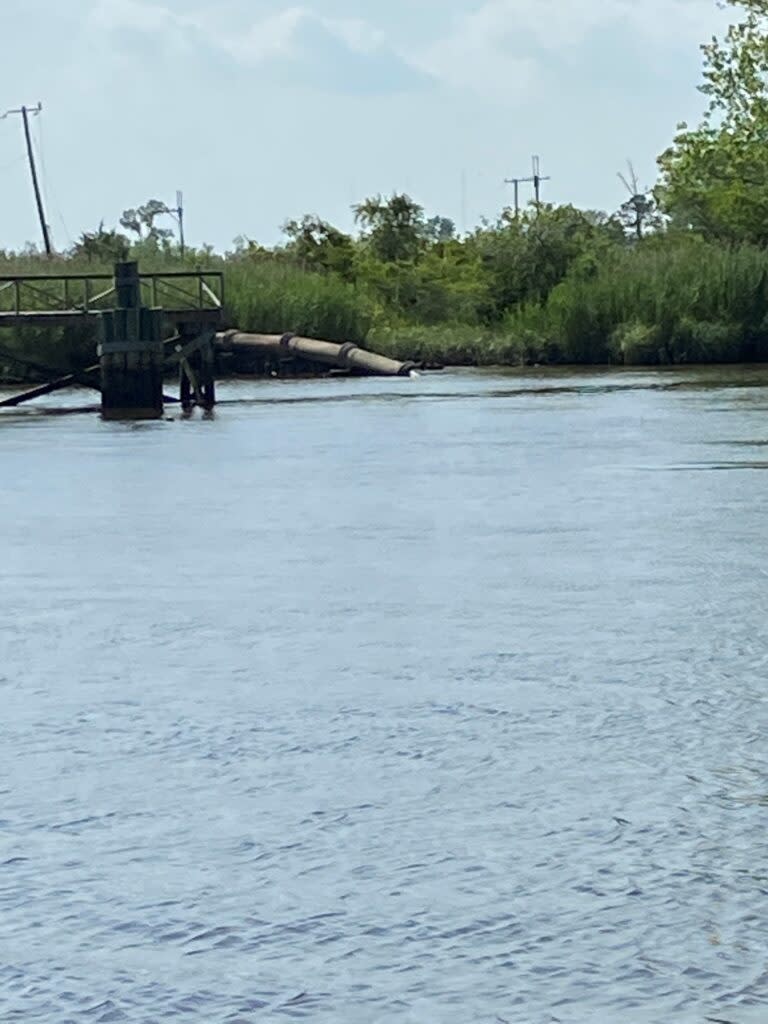At urging of NC Chamber, some environmental commission members want to delay PFAS rules

This pipe carries water from upstream and discharges into the Cape Fear River in Wilmington. Before Chemours stopped discharging GenX into the river, this pipe was a source of the contamination, according to a former riverkeeper. (Photo: Lisa Sorg)
At least two members of the state Environmental Management Commission are stalling proposed rules that would limit the amount of toxic PFAS in groundwater, according to a letter from the Secretary of the Environment Elizabeth Biser, who is advocating for the rules to proceed.
And their objections mirror those of the North Carolina Chamber of Commerce, which is also opposing the standards, not only in groundwater but surface water.
Joe Reardon and Tim Baumgartner serve as the chairman and vice-chairman of the EMC’s Groundwater & Waste Management Committee. They “are refusing to hear” the proposed standards as an action item at tomorrow’s meeting, Biser wrote, instead “asking for yet another informational presentation on the topic.”
The committee is scheduled to meet Wednesday, May 8 at 10:15 a.m. at the Archdale Building, 512 N. Salisbury St. in downtown Raleigh. There is also a virtual option.
DEQ staff have given three presentations on the proposed standards to the EMC and its committees since last fall. The purpose of the proposal is to reduce levels of PFAS in the drinking water supplies. This could help utilities meet the new EPA drinking water standards, enacted in mid-April.
Exposure to PFAS has been linked to multiple health problems, including thyroid and liver disorders, reproductive and fetal development problems, immune system deficiencies, high cholesterol, and kidney, testicular and other cancers.
There are 15,000 types of PFAS, of which the EMC is considering standards for eight. Based on the EPA’s toxicology studies, DEQ is recommending maximum levels ranging from 0.001 parts per trillion for PFOA, 0.7 ppt for PFOS and 20 ppt for GenX.
Less stringent levels – 2,000 to 7,000 ppt – would apply to several other types.
More than 2 million people in North Carolina rely on groundwater for their drinking water, as do dozens of public and privately owned utilities.
Who’s slow-walking the PFAS rules?
Joe Reardon, who once served as the assistant commissioner of agriculture, was appointed to the EMC by his former boss, Republican Agriculture Commissioner Steve Troxler. Reardon is the chairman of the Groundwater & Waste Committee.
Troxler’s appointment powers are new. Last year, the legislature passed a bill that stripped some EMC appointment powers from the governor while allowing the agriculture commissioner to fill two seats; previously the commissioner did not appoint members to the EMC.
Tim Baumgartner, who worked for DEQ in the Division of Mitigation Services for eight years, was appointed by Republican Senate leader Phil Berger.
Baumgartner, the vice chairman of the Groundwater & Waste Committee, is now a senior environmental manager with the private consulting firm Ecosystem Planning & Restoration, which has won millions of dollars in state contracts for flood control and other environmental projects.
EMC Chairman J.D. Solomon was appointed by House Speaker Tim Moore, a Republican. In January, the majority of his fellow EMC members voted to make him chairman, replacing environmental attorney Robin Smith, an appointee of Gov. Cooper.
“Setting groundwater standards protects public water supply wells and is also the most equitable way to ensure millions of residents who rely on private wells get the same protection as public water customers,” Biser wrote to the EMC, in a letter dated May 1.
“Absent further and immediate action by the Commission, residents and local utilities will continue to shoulder the burden of treatment costs while groundwater cleanup is delayed.”
The committee’s inaction would prevent the full EMC from sending the proposal to public comment and fiscal review this month, further delaying its possible implementation. The EMC was scheduled to vote on the proposal in November.
J.D. Solomon, who is chairman of the full EMC, did not answer several questions from Newsline about proposed rules, but said the “topic will be discussed” at this week’s meetings.
Meanwhile, the North Carolina Chamber of Commerce sent a letter on April 22 to the EMC and Secretary Biser asking them to delay the proposed rules.
“It is important that we do not hastily pass regulations without fully accounting for the positive benefits and potential negative impacts proposed rules would have on the state and its business community,” wrote Chamber President and CEO Gary Salamido to environmental officials.
Yet those very costs and benefits would be detailed as part of the rulemaking process – the same process the chamber is asking to delay.
Salamido did not answer questions from Newsline, but Kate Payne, vice president of communications for the Chamber, provided a statement that read, in part: “The NC Chamber has a transparent and open process to engage government when advocating for certainty and predictability for North Carolina’s business community, particularly on the regulatory front. The business community is made up of the people who live in communities across our state, these people, and these businesses, pay the bills and enjoy the clean air and water with their families. We all want a healthy environment that balances economic growth.”
Several current or historical dischargers of PFAS, including DuPont, International Paper and GFL, which operates dozens of landfills in the state, belong to the NC Chamber, the state’s largest broad-based business advocacy organization.
However, some of its members also bear the brunt of the contamination. UNC-Wilmington, among those in the Lower Cape Fear River Basin whose water supply was contaminated, is also a Chamber member.
UNC Wilmington spokesperson Andrea Weaver told Newsline it “was not contacted by the Chamber” about the letter to environmental officials. We don’t have further comments.”
The post At urging of NC Chamber, some environmental commission members want to delay PFAS rules appeared first on NC Newsline.

